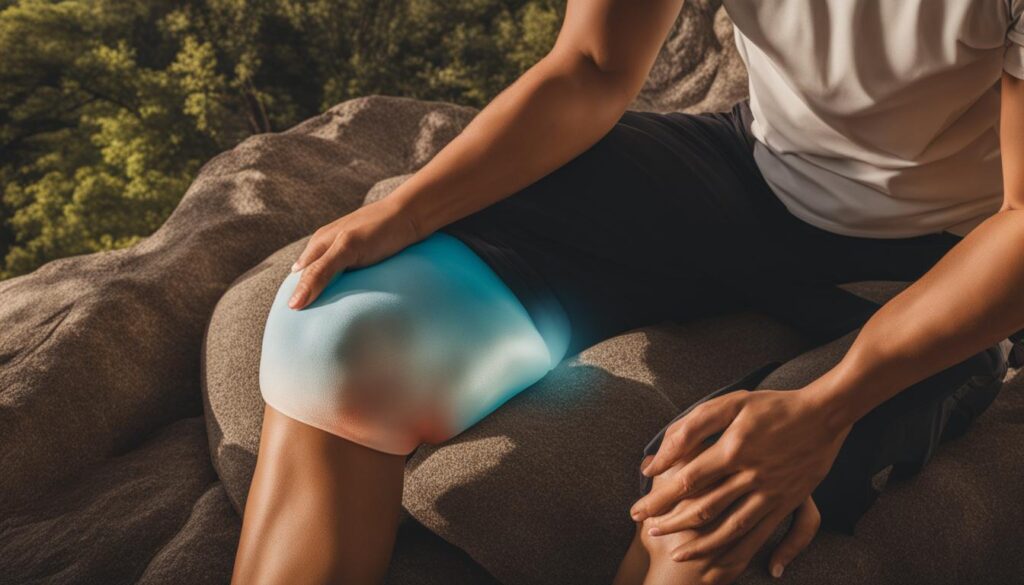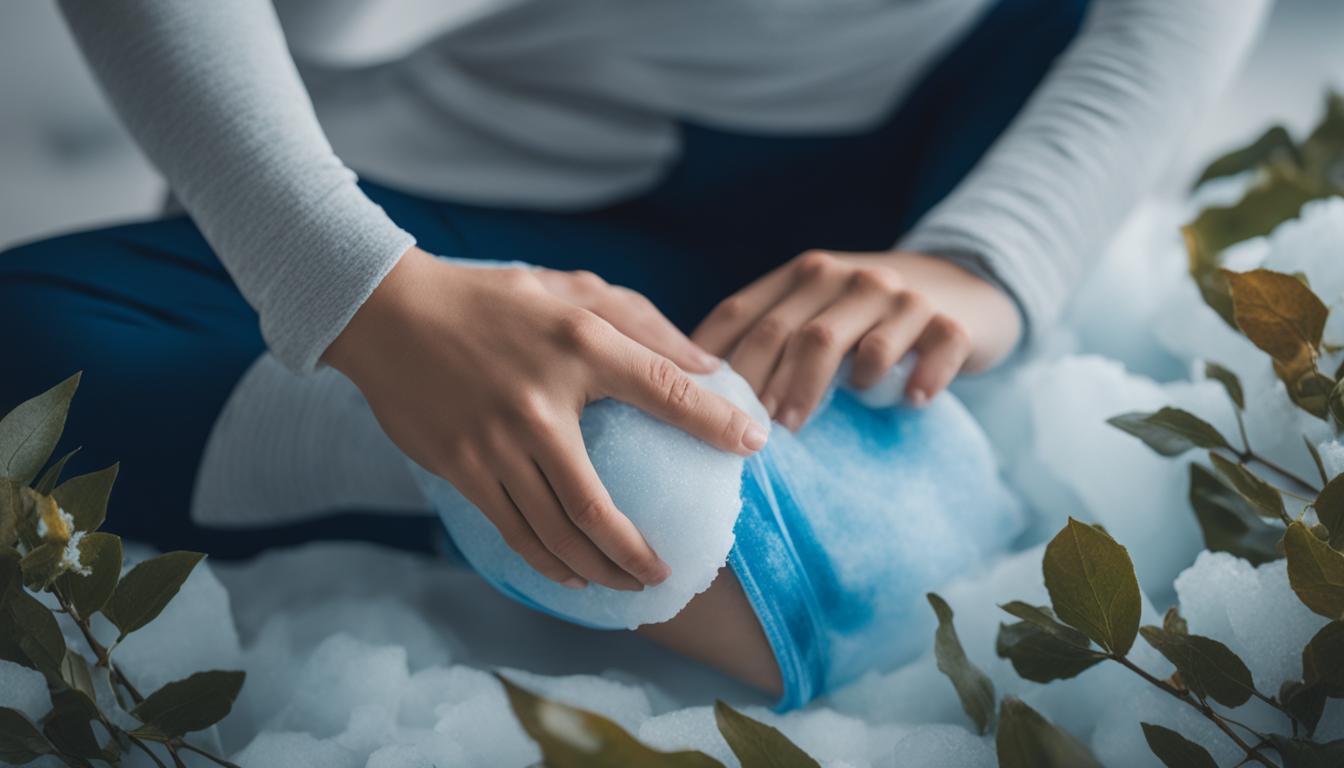Are you experiencing knee muscle pain? Whether it’s due to a recent injury or long-standing arthritis, finding relief is crucial for your overall well-being. At [Website Name], we understand the discomfort and limitations knee pain can bring. That’s why we’ve compiled a comprehensive guide to help you manage and alleviate knee muscle pain effectively.
When it comes to knee muscle pain, prevention and treatment go hand in hand. By following the right strategies, you can enhance your mobility, reduce discomfort, and improve your quality of life. In this article, we’ll explore exercises for knee pain relief, home remedies, treatment options, and alternative therapies.
Key Takeaways:
- Regular exercise, including cardio and strength training, can strengthen the muscles around the knee and provide relief.
- Home remedies such as knee supports, dietary adjustments, and weight management can play a significant role in managing knee pain.
- Treatment options for knee pain vary depending on the underlying cause, but they may include physical therapy, medications, and heat/cold therapy.
- Alternative therapies like herbal ointments and ginger extracts may provide additional relief, but it’s essential to consult with a healthcare professional first.
- Remember to listen to your body, seek professional advice, and take immediate action if symptoms worsen or persist.
By following the expert tips and advice provided in this article, you can take proactive steps towards soothing relief for your knee muscle pain. Remember, everyone’s situation is unique, so it’s crucial to customize your approach based on your needs and consult with a healthcare professional for personalized guidance.
Exercise for Knee Pain Relief
When it comes to managing knee muscle pain, exercise plays a crucial role. By engaging in the right exercises, you can find relief from knee pain and improve your overall muscle strength and flexibility.
Cardio exercises strengthen the muscles of the heart, but not the joints. It is weight training mixed with keeping your muscles limber. Cardio is important for keeping your weight stable and you feeling stronger overall.
To alleviate knee pain and achieve better knee muscle health, it’s essential to incorporate a variety of exercises into your routine. Cardiovascular exercises can help with weight management and overall strength. Consider adding the following exercises to your fitness regimen:
- Walking: Take brisk walks to engage your leg muscles and improve joint flexibility.
- Swimming: Swim laps or participate in water aerobics to enjoy a low-impact, full-body workout.
- Stationary cycling: Pedal on a stationary bike to strengthen leg muscles without putting excessive strain on your knees.
- Elliptical machines: Use elliptical trainers that offer low-impact, joint-friendly workouts.
In addition to these exercises, consider incorporating tai chi into your routine. This gentle form of exercise can help ease stiffness, improve balance, and promote overall joint health.
Remember, it’s important to start slowly and gradually increase the intensity and duration of your workouts. Always listen to your body and seek guidance from a healthcare professional before starting any new exercise program, especially if you have pre-existing knee conditions or ongoing knee pain.
Home Remedies for Knee Pain
When it comes to managing knee pain at home, there are several effective remedies you can try. These remedies can provide knee pain relief, promote healing, and help with long-term knee muscle pain treatment. Incorporating these strategies into your daily routine can make a significant difference in managing knee pain and improving your overall quality of life.
Exercise
Regular exercise is an essential component of knee pain relief and muscle pain treatment. Strengthening the muscles around your knee helps provide support and stability. Consider low-impact exercises such as swimming, cycling, and walking, as they are gentle on the joints while providing cardiovascular benefits. It’s important to consult with a healthcare professional before starting any exercise program to ensure that you choose exercises that are appropriate for your specific condition.
Use a Knee Support
A knee support or brace can provide added stability and help reduce knee pain. These supportive devices are designed to alleviate pressure on the knee joint, provide compression, and offer added protection during physical activity. They can be particularly beneficial for individuals with knee injuries or joint conditions such as arthritis. Consult with a healthcare professional to determine the right type of knee support for your needs.
Dietary Measures and Weight Management
Adopting a healthy diet and maintaining a healthy weight can have a positive impact on knee pain relief. Excess weight puts additional stress on the knee joints, exacerbating pain and inflammation. Incorporate foods rich in anti-inflammatory properties, such as fruits, vegetables, whole grains, and lean proteins, into your diet. Avoid processed foods, sugary snacks, and excessive salt intake, as they can contribute to inflammation. Additionally, maintaining a healthy weight through proper nutrition and regular exercise can help alleviate knee pain and prevent further muscle-related issues.
Aromatherapy and CBD Oil
Aromatherapy and CBD oil have gained popularity for their potential benefits in pain management and relaxation. Many essential oils, such as lavender and eucalyptus, have soothing properties that can help ease knee muscle pain and promote relaxation. CBD oil, derived from the cannabis plant, has shown promise in reducing inflammation and providing pain relief. It’s important to consult with a healthcare professional or an aromatherapist before using aromatherapy or CBD oil to ensure proper usage and dosage.
By incorporating these home remedies into your routine, you can effectively manage knee pain and promote healing. However, it’s important to remember that every individual is unique, and what works for one person may not work for another. Consult with a healthcare professional for personalized advice and guidance tailored to your specific needs.
Treatment Options for Knee Pain
The treatment for knee pain will depend, to some extent, on the cause of the problem. However, there are several simple remedies that can help provide relief for knee muscle pain and promote overall knee health.
Physical Activity
Engaging in regular physical activity is crucial for managing knee pain. Low-impact exercises such as swimming, cycling, and walking can help strengthen the muscles around the knee, improving stability and reducing pain. It is important to consult with a healthcare professional or a physical therapist to determine the most suitable exercises for your specific condition.
Strengthening Exercises
Targeted exercises that focus on strengthening the muscles supporting the knee joint can provide significant relief from knee pain. These exercises may include leg presses, squats, lunges, and leg curls. Stronger muscles help absorb shock and reduce stress on the knee joint. Again, it is advisable to work with a healthcare professional or a physical therapist who can guide you through a proper strengthening exercise routine.
Posture and Support
Improper posture and lack of support can contribute to knee pain. Maintaining good posture and using supportive footwear or orthotic inserts can help alleviate knee pain by reducing stress on the knee joint. It is recommended to invest in shoes with adequate arch support and cushioning to ensure proper alignment and reduce the risk of injury.
Weight Loss and a Healthy Diet
Excess weight puts added pressure on the knees, leading to increased pain and discomfort. Losing weight through a combination of a healthy diet and regular exercise can significantly reduce knee pain. A diet rich in anti-inflammatory foods, such as fruits, vegetables, whole grains, and lean proteins, can also help manage knee pain by reducing inflammation in the body.
Medications
In some cases, over-the-counter pain medications such as acetaminophen or nonsteroidal anti-inflammatory drugs (NSAIDs) can provide temporary relief from knee pain. However, it is important to consult with a healthcare professional before taking any medications, especially if you have underlying health conditions or are currently taking other medications.
Massage, Heat and Cold Therapy
Massage therapy can help reduce muscle tension and improve blood flow to the knee area, providing relief from pain. Heat therapy, such as using warm towels or heating pads, can help relax muscles and ease knee pain. Cold therapy, such as applying ice packs or cold compresses, can help reduce inflammation and numb the affected area, temporarily relieving pain.
Acupuncture
Acupuncture, a traditional Chinese medicine practice, involves inserting thin needles into specific points on the body to alleviate pain and promote healing. Some studies have shown that acupuncture can be an effective treatment for knee pain. However, it is important to consult with a qualified acupuncturist and discuss your symptoms and medical history before undergoing acupuncture treatments.

| Treatment Option | Description |
|---|---|
| Physical Activity | Engaging in low-impact exercises to strengthen the muscles around the knee joint and improve stability. |
| Strengthening Exercises | Targeted exercises focusing on strengthening the muscles supporting the knee joint to reduce pain and improve function. |
| Posture and Support | Maintaining good posture and using supportive footwear or orthotic inserts to reduce stress on the knee joint. |
| Weight Loss and a Healthy Diet | Losing weight to alleviate pressure on the knees and following a diet rich in anti-inflammatory foods to reduce inflammation. |
| Medications | Over-the-counter pain medications or NSAIDs to provide temporary relief from knee pain. |
| Massage, Heat and Cold Therapy | Massage therapy, heat therapy, and cold therapy to relax muscles, reduce inflammation, and temporarily relieve knee pain. |
| Acupuncture | Traditional Chinese medicine practice involving the insertion of thin needles to alleviate knee pain and promote healing. |
Herbal and Alternative Therapies for Knee Pain
When it comes to finding relief for knee muscle pain, there are various herbal and alternative therapies that may offer some respite. While these remedies have been known to help alleviate discomfort, it’s crucial to consult with a healthcare professional before trying any alternative therapies.
“Natural remedies like herbal ointments, willow bark, and ginger extract have shown promise in providing relief for knee pain.”
Herbal ointments have been used for centuries to ease muscle pain and inflammation. These ointments often contain natural ingredients like arnica, eucalyptus, and menthol, which can provide a soothing sensation to the affected area.
Furthermore, willow bark, which contains a compound similar to aspirin, may help reduce pain and inflammation in the knee joint. This natural remedy has been used for centuries in traditional medicine.
Ginger extract is another herbal alternative that might offer relief for knee muscle pain. Ginger has anti-inflammatory properties and may help reduce swelling and discomfort in the affected area.
While these alternative therapies have shown promise, it’s important to note that not all remedies are equally effective. For example, glucosamine and chondroitin sulfate supplements, commonly marketed for joint health, have not been proven to be effective in relieving knee pain according to scientific research.
To determine the most suitable and effective alternative therapy for your knee pain, it is best to consult with a healthcare professional who can provide personalized recommendations based on your specific condition.

| Herbal and Alternative Therapies | Potential Benefits |
|---|---|
| Herbal ointments | Relieves muscle pain and inflammation |
| Willow bark | Reduces pain and inflammation |
| Ginger extract | Decreases swelling and discomfort |
| Glucosamine and chondroitin sulfate supplements | Not proven effective for knee pain relief |
Conclusion
In conclusion, there are several effective methods for managing knee muscle pain and finding relief. The first step is to consult with a healthcare professional to determine the underlying cause of your pain and develop a customized treatment plan. They can guide you on the best approach for your individual needs, whether it involves exercise, home remedies, treatment options, or alternative therapies.
Regular exercise is crucial for strengthening the muscles around the knee and improving joint stability. Cardio exercises like walking, swimming, and cycling can help maintain a healthy weight and overall strength. Additionally, specific exercises targeted at the knee muscles can provide pain relief and improve flexibility.
Home remedies such as using knee supports, practicing weight management, and incorporating dietary measures may also contribute to reducing knee pain. Furthermore, alternative therapies such as herbal ointments, ginger extract, and willow bark can be considered, but it’s important to consult with a healthcare professional before trying any alternative remedies.
Remember, it is important to listen to your body throughout the pain management process. If your symptoms worsen or persist, seek immediate medical attention. By following these tips and working closely with healthcare professionals, you can effectively manage knee muscle pain and find the relief you deserve.
FAQ
What can I do to relieve knee muscle pain?
You can try various methods such as exercise, home remedies, treatment options, and alternative therapies. Consult with a healthcare professional to determine the best approach for your individual needs.
What are some exercises that can help with knee pain relief?
Some exercises that may provide relief for knee pain include walking, swimming, water aerobics, stationary cycling, elliptical machines, and tai chi. These exercises can help strengthen the muscles around the knee and improve overall joint stability.
Are there any home remedies for knee pain?
Yes, there are several home remedies that may help with knee pain. These include using a knee support, practicing dietary measures, managing your weight, trying aromatherapy or CBD oil, and using heat and cold therapy. Make sure to consult with a healthcare professional before trying any remedies.
What are the treatment options for knee pain?
Treatment options for knee pain may include physical activity, strengthening exercises, maintaining good posture and support, weight loss and a healthy diet, medications, massage therapy, heat and cold therapy, and acupuncture. The specific treatment will depend on the cause of your knee pain.
Are there any herbal or alternative therapies that may help with knee pain?
Some herbal ointments, willow bark, ginger extract, and other alternative therapies have been suggested to provide relief for knee pain. However, it is important to consult with a healthcare professional before trying any alternative remedies, as their effectiveness may vary.

Leave a Reply